
NJAS-Impact in Agricultural and Life Sciences
Scope & Guideline
Bridging gaps in agricultural and life sciences through collaborative insights.
Introduction
Aims and Scopes
- Interdisciplinary Research:
The journal promotes research that integrates various disciplines, such as economics, sociology, and environmental science, to address agricultural challenges. - Sustainable Agricultural Practices:
A core focus is on sustainable practices that enhance productivity while minimizing environmental impact, including studies on crop rotation, organic farming, and waste management. - Technological Innovations in Agriculture:
Research on the adoption and impact of new technologies, such as digital tools, AI, and decision support systems, to improve agricultural efficiency and effectiveness is a prominent area. - Socio-Economic Impacts of Agriculture:
The journal examines the socio-economic dimensions of agricultural practices, including gender roles, food security, and the influence of policy and market dynamics. - Climate Change Adaptation:
There is a consistent focus on understanding how agricultural systems can adapt to climate change, including studies on resilience-building and resource management. - Public Health and Nutrition:
Research exploring the intersection of agriculture, food systems, and public health, particularly in relation to nutrition and food safety, is highlighted.
Trending and Emerging
- Digital Transformation in Agriculture:
There is an increasing focus on the role of digital technologies and tools in agriculture, including precision farming and digital twins, highlighting the importance of innovation in agricultural practices. - Gender and Social Equity in Agriculture:
Research addressing gender roles and social equity within agricultural contexts is emerging as a vital theme, emphasizing the need for inclusive practices that benefit marginalized groups. - Circular Economy and Sustainable Practices:
The concept of circular economy is gaining prominence, with studies exploring sustainable practices that enhance resource efficiency and reduce waste in agricultural systems. - Resilience and Climate Adaptation Strategies:
Emerging themes revolve around resilience-building and adaptation strategies for farmers in the face of climate change, underscoring the urgency of addressing climate-related challenges. - Interdisciplinary Approaches to Agri-Food Systems:
There is a notable trend towards interdisciplinary research that examines agri-food systems holistically, integrating ecological, social, and economic perspectives.
Declining or Waning
- Traditional Farming Practices:
There seems to be a waning focus on studies centered around traditional farming methods, as more research shifts towards modern and innovative agricultural practices. - Purely Economic Analyses:
Analyses that solely focus on economic metrics without considering social or environmental contexts are becoming less common, as interdisciplinary approaches gain traction. - Generalized Agricultural Models:
Models that do not account for local context and specificities are appearing less frequently, with a shift towards more customized and localized research.
Similar Journals

Revista Ciencia Agronomica
Cultivating knowledge for a greener tomorrow.Revista Ciencia Agronomica is a leading open access journal published by the Universidade Federal do Ceará, Departamento de Geociências, dedicated to advancing the field of agricultural sciences. Established in 2008, the journal has emerged as a significant platform for the dissemination of original research and innovative advancements in areas including agronomy, horticulture, and soil science, with a dedicated convergence of years extending to 2025. With an impactful presence in academic circles—ranking in Q3 for Agronomy and Crop Science and Soil Science and Q2 for Horticulture in 2023—this journal provides vital insights for researchers and practitioners alike. Although specific HIndex metrics are currently unavailable, the journal's Scopus rankings attest to its relevance, placing it in the 52nd, 44th, and 43rd percentiles across multiple pertinent categories. Since transitioning to an open access model in 2010, Revista Ciencia Agronomica has committed to maximizing the reach and impact of its published work, thereby ensuring valuable contributions to global agricultural knowledge.

INDIAN JOURNAL OF AGRICULTURAL SCIENCES
Empowering research to enhance food security.Welcome to the Indian Journal of Agricultural Sciences, a vital resource for researchers and professionals in the field of agricultural sciences, published by the esteemed Indian Council of Agricultural Research. Established in 1974, this journal aims to disseminate high-quality research and developments in agronomy and crop science, facilitating knowledge exchange and advancement within the agricultural community. Though currently classified in the Q4 category according to 2023 data, it provides an essential platform for publication, contributing valuable insights towards sustainable agricultural practices. With an ISSN of 0019-5022 and an E-ISSN of 2394-3319, the journal houses important research that spans decades of convergence and collaboration, promoting innovation in agriculture across India and beyond. As an open access platform, it invites contributions that reflect a wide array of agricultural disciplines to foster sustainable food systems that address the challenges of food security. Join the network of scholars and practitioners by sharing your research and engaging with the profound work being done in this transformative field.

Asian Journal of Agriculture and Development
Bridging science and policy for a sustainable agricultural future.Asian Journal of Agriculture and Development is a prestigious academic journal dedicated to advancing the field of agricultural research and development within the context of Southeast Asia. Published by the Southeast Asian Regional Center for Graduate Study and Research in Agriculture, this journal plays a vital role in disseminating innovative findings and best practices critical for sustainable agricultural development in the region. With a focus on interdisciplinary studies that integrate agricultural science, policy development, and socio-economic factors, the journal invites researchers, professionals, and students to contribute rigorous research that addresses contemporary challenges faced by the agriculture sector. Although it operates within a non-open access framework, the journal aims to ensure wide visibility and accessibility of its publications through strategic collaborations and institutional partnerships. By engaging with its content, stakeholders can gain valuable insights and foster meaningful dialogue that drives forward agricultural progress in Asia.
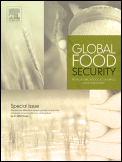
Global Food Security-Agriculture Policy Economics and Environment
Fostering interdisciplinary dialogue for a sustainable food future.Global Food Security - Agriculture Policy Economics and Environment is a leading interdisciplinary journal published by Elsevier that addresses critical issues in food security through the lens of agriculture, economics, and environmental sustainability. With an impressive impact factor and a distinguished placement in the Q1 quartile across multiple categories including Ecology, Food Science, and Safety Research for 2023, this journal is a vital resource for researchers and practitioners aiming to address modern challenges in global food systems. Covering essential topics from agricultural policy to ecological implications, the journal provides a platform for innovative research and policy discussions that foster the advancement of food security on a global scale. Notably, it is indexed in Scopus, where it ranks in the top percentiles across its relevant categories, reflecting its significance in the field. The journal is accessible to a wide audience, making it an indispensable source of knowledge for professionals and students aiming to tackle the complex interplay between food production and environmental stewardship.
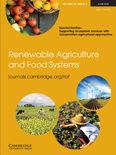
RENEWABLE AGRICULTURE AND FOOD SYSTEMS
Advancing sustainable practices in agriculture and food.RENEWABLE AGRICULTURE AND FOOD SYSTEMS, published by Cambridge University Press, is a leading open-access journal dedicated to the advancement of sustainability in agricultural practices and food systems. With an ISSN of 1742-1705 and an E-ISSN of 1742-1713, this journal spans the interdisciplinary fields of agronomy and food science, achieving a commendable Q2 ranking in both categories for 2023. As it continues to converge through the years from 2004 to 2024, the journal offers a platform for researchers, professionals, and students to disseminate transformative research that addresses the challenges of food security, resource management, and environmental impact. The journal’s significant impact is underscored by its Scopus rankings, situating it in the 77th percentile among agronomy and crop science publications, and the 67th percentile in food science. Since becoming fully open access in 2023, RENEWABLE AGRICULTURE AND FOOD SYSTEMS promotes wider accessibility to vital research findings, fostering collaboration and innovation in the pursuit of sustainable agricultural practices and food systems worldwide.
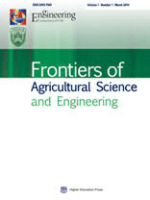
Frontiers of Agricultural Science and Engineering
Unlocking biotechnological breakthroughs for global challenges.Frontiers of Agricultural Science and Engineering, published by HIGHER EDUCATION PRESS, is a distinguished open-access journal established in 2014, dedicated to advancing research across the fields of agricultural and biological sciences, biotechnology, and veterinary studies. With an impressive Q1 ranking in both Agricultural and Biological Sciences and Veterinary categories for 2023, this journal positions itself prominently within the academic landscape, reflecting the importance and quality of the research it disseminates. The journal serves as a vital platform for researchers, professionals, and students worldwide, featuring a broad array of studies that enhance our understanding of agricultural technologies, biotechnological innovations, and veterinary sciences. With a focus on rigor and accessibility, Frontiers of Agricultural Science and Engineering promotes the global exchange of knowledge, encouraging the collaboration that is essential for tackling contemporary challenges in these critical fields. Available online with a comprehensive range of article options, it continues to contribute to the scientific community's advancements in agricultural and biological disciplines.
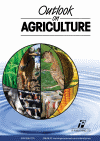
OUTLOOK ON AGRICULTURE
Transforming Agriculture Through Scholarly ExcellenceOUTLOOK ON AGRICULTURE is a prestigious journal published by SAGE Publications Ltd, focusing on the multifaceted field of agricultural sciences. With an ISSN of 0030-7270 and E-ISSN 2043-6866, this journal has been serving the academic community since its inception in the mid-1970s. Renowned for its rigorous peer-review process, it holds a significant impact factor within its category, consistently ranking in the Q1 and Q2 quartiles across several disciplines, including Agronomy, Animal Science, and Ecology. The journal provides researchers, professionals, and students with cutting-edge research and innovative developments that are essential for advancing agricultural practices and sustainability. Published in the United Kingdom, the journal is committed to promoting scholarly dialogue and dissemination of knowledge, making it an invaluable resource for anyone engaged in the agricultural sciences. Readers can expect a well-curated selection of articles that contribute to the global agricultural discourse and provide insights into the challenges and opportunities within the sector.

AGROCIENCIA
Empowering research that cultivates environmental solutions.AGROCIENCIA, published by COLEGIO POSTGRADUADOS, is a key journal in the fields of agronomy, animal science, and environmental science in Mexico. With an ISSN of 1405-3195 and an E-ISSN of 2521-9766, this journal has been a crucial platform for disseminating research findings since its inception in 2000. Operating from Montecillo, Estado Mexico, it provides an outlet for scholars and practitioners to share innovations and insights that directly impact agricultural practices and environmental sustainability. Despite its current categorization in the Q4 quartile across multiple disciplines, AGROCIENCIA strives to elevate the quality and reach of research, fostering a collaborative approach to tackle pressing issues within the agricultural sciences. Access options are primarily through institutional subscriptions, allowing for a diverse audience of researchers, professionals, and students to engage with the latest studies aimed at advancing knowledge in the agricultural sector. As the journal converges towards its 2024 milestone, it remains dedicated to enhancing scientific inquiry and promoting effective solutions within its discipline.
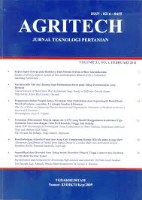
Agritech
Innovating the Future of Farming Through TechnologyAgritech is a prominent open-access journal dedicated to advancing the field of agricultural technology. Published by UNIV GADJAH MADA, FAC AGRICULTURAL TECHNOLOGY, this esteemed journal disseminates innovative research and cutting-edge practices that contribute significantly to sustainable agriculture, precision farming, and environmental stewardship. Launched in 1999, Agritech has established itself as a vital resource for researchers, professionals, and students alike, providing a platform for the exchange of ideas and findings that shape the future of agricultural technology. By embracing an open-access model, the journal ensures that high-quality research is accessible to a global audience, promoting collaboration and knowledge sharing in the agricultural community. With an ISSN of 0216-0455 and an E-ISSN of 2527-3825, Agritech remains committed to enriching agricultural practices and policies through rigorous scientific inquiry and innovation.
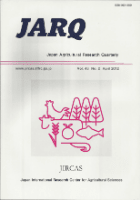
JARQ-JAPAN AGRICULTURAL RESEARCH QUARTERLY
Championing Research for Tomorrow's AgricultureJARQ - Japan Agricultural Research Quarterly serves as a pivotal platform in the field of agricultural sciences, published by the esteemed Japan International Research Center for Agricultural Sciences. Established in 1973, this journal has a rich history and plays a critical role in disseminating significant research findings relevant to agronomy, crop science, animal science, ecology, and biotechnology. Despite its ranking in the lower quartiles, with impressive coverage from 1973 to 2024, it continues to attract contributions that enhance agricultural strategies and practices in Japan and beyond. The journal facilitates discussions that are essential for fostering innovation in agricultural methodologies and environmental sustainability. Accessible to a diverse audience, including researchers, academics, and practitioners, JARQ emphasizes the importance of advancing agricultural research and its implications for food security and ecological balance.